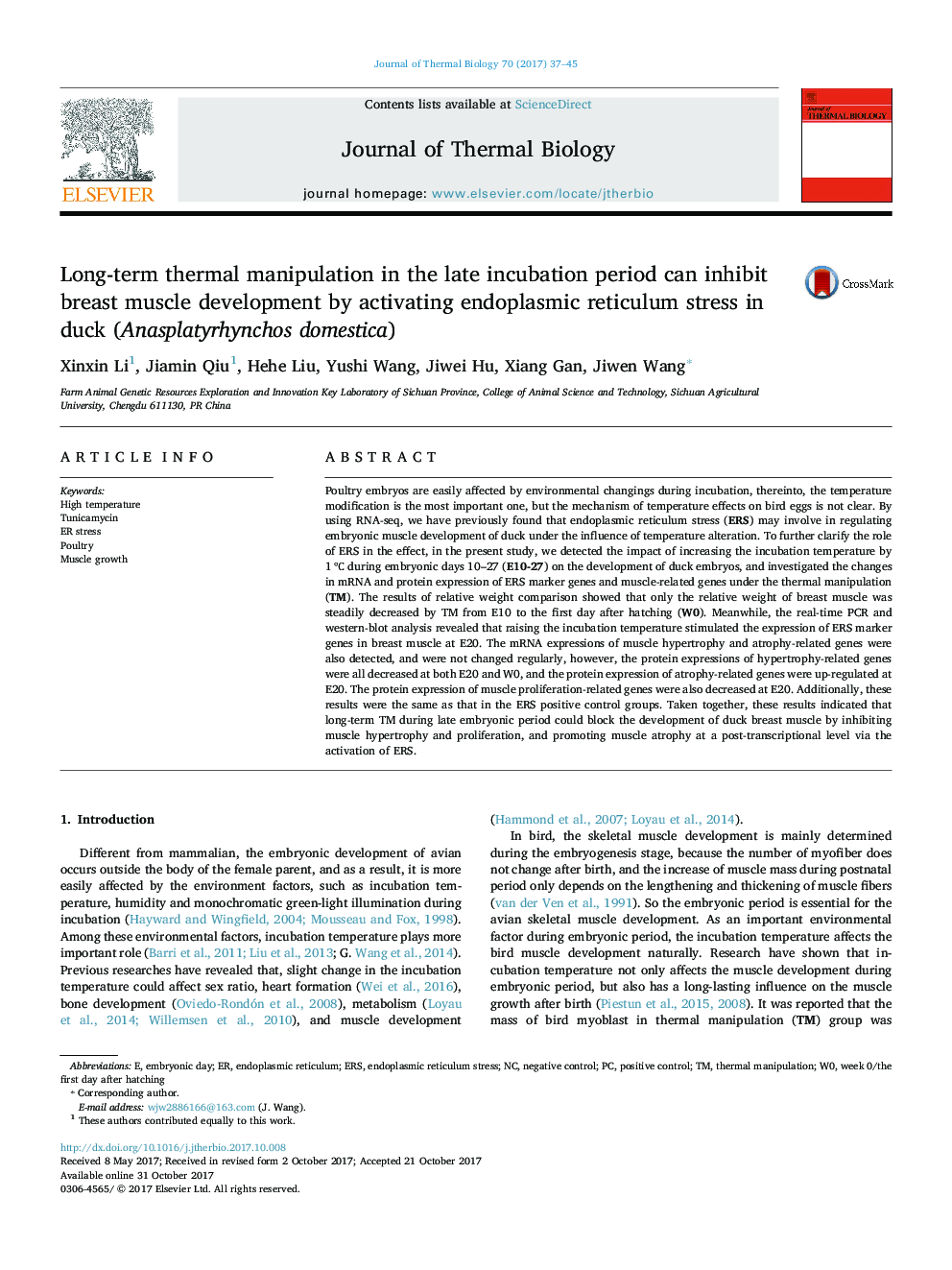| کد مقاله | کد نشریه | سال انتشار | مقاله انگلیسی | نسخه تمام متن |
|---|---|---|---|---|
| 8650168 | 1571077 | 2017 | 9 صفحه PDF | دانلود رایگان |
عنوان انگلیسی مقاله ISI
Long-term thermal manipulation in the late incubation period can inhibit breast muscle development by activating endoplasmic reticulum stress in duck (Anasplatyrhynchos domestica)
دانلود مقاله + سفارش ترجمه
دانلود مقاله ISI انگلیسی
رایگان برای ایرانیان
کلمات کلیدی
ERStunicamycinER stress - استرس استEndoplasmic reticulum stress - استرس شبکه آندوپلاسمیHigh temperature - درجه حرارت بالاThermal manipulation - دستکاری حرارتیMuscle growth - رشد عضلهembryonic day - روز جنینیendoplasmic reticulum - شبکه آندوپلاسمی Poultry - ماکیانPositive control - کنترل مثبتnegative control - کنترل منفی
موضوعات مرتبط
علوم زیستی و بیوفناوری
علوم کشاورزی و بیولوژیک
علوم کشاورزی و بیولوژیک (عمومی)
پیش نمایش صفحه اول مقاله

چکیده انگلیسی
Poultry embryos are easily affected by environmental changings during incubation, thereinto, the temperature modification is the most important one, but the mechanism of temperature effects on bird eggs is not clear. By using RNA-seq, we have previously found that endoplasmic reticulum stress (ERS) may involve in regulating embryonic muscle development of duck under the influence of temperature alteration. To further clarify the role of ERS in the effect, in the present study, we detected the impact of increasing the incubation temperature by 1Â â during embryonic days 10-27 (E10-27) on the development of duck embryos, and investigated the changes in mRNA and protein expression of ERS marker genes and muscle-related genes under the thermal manipulation (TM). The results of relative weight comparison showed that only the relative weight of breast muscle was steadily decreased by TM from E10 to the first day after hatching (W0). Meanwhile, the real-time PCR and western-blot analysis revealed that raising the incubation temperature stimulated the expression of ERS marker genes in breast muscle at E20. The mRNA expressions of muscle hypertrophy and atrophy-related genes were also detected, and were not changed regularly, however, the protein expressions of hypertrophy-related genes were all decreased at both E20 and W0, and the protein expression of atrophy-related genes were up-regulated at E20. The protein expression of muscle proliferation-related genes were also decreased at E20. Additionally, these results were the same as that in the ERS positive control groups. Taken together, these results indicated that long-term TM during late embryonic period could block the development of duck breast muscle by inhibiting muscle hypertrophy and proliferation, and promoting muscle atrophy at a post-transcriptional level via the activation of ERS.
ناشر
Database: Elsevier - ScienceDirect (ساینس دایرکت)
Journal: Journal of Thermal Biology - Volume 70, Part B, December 2017, Pages 37-45
Journal: Journal of Thermal Biology - Volume 70, Part B, December 2017, Pages 37-45
نویسندگان
Xinxin Li, Jiamin Qiu, Hehe Liu, Yushi Wang, Jiwei Hu, Xiang Gan, Jiwen Wang,